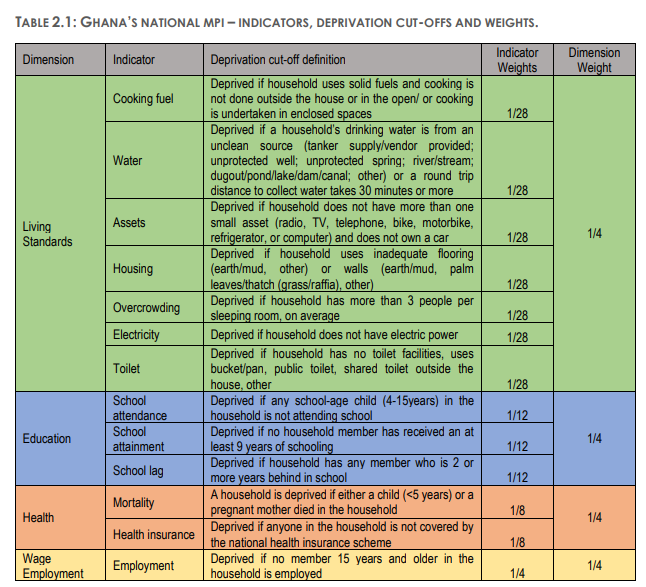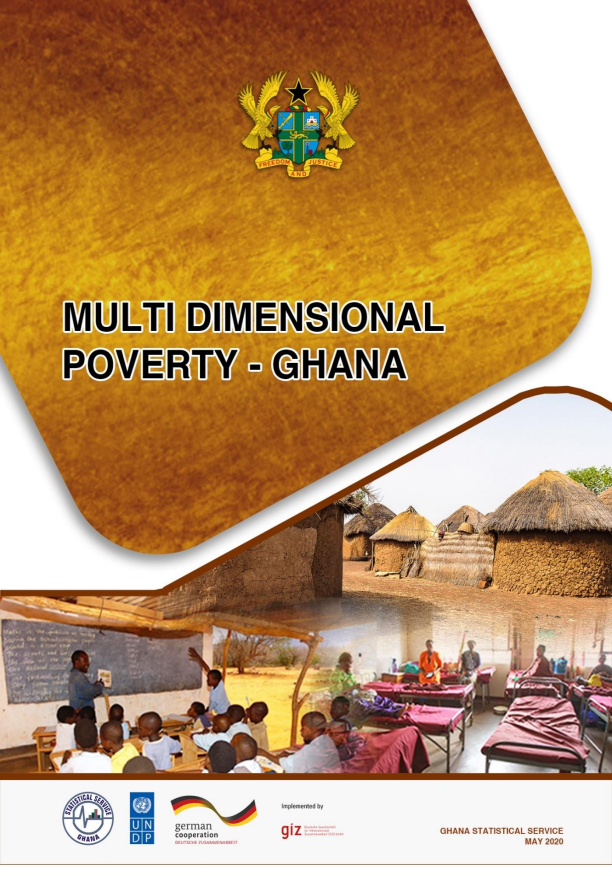Ghana MPI
MPI originally introduced: 2020
Latest MPI results: Ghana MPI 2021
Ghana Statistical Service has published 261 fact sheets and is in the process of publishing 261 district level reports on multidimensional poverty. The analysis is based on data from the Ghana 2021 Population and Housing Census which included MPI questions. These materials are the first statistics for multidimensional poverty across Ghana's 261 districts and are being used to inform poverty reduction initiatives and monitor progress towards national and international goals.
- 261 District-level Multidimensional Poverty Reports
- Multidimensional Poverty Report Fact Sheet for each district (example of Accra Metropolitan Area District, please visit the GSS website for other examples)
Previous results
The Ghana Statistical Service launched the Ghana MPI in July 2020. Their first report was produced with support from the United Nations Development Programme (UNDP), the German Agency for International Cooperation (GIZ), and OPHI.
The national MPI was computed using data from the Ghana Living Standards Survey (GLSS) 2016/2017 and the 2011 and 2018 Ghana Multiple Indicator Cluster Surveys (MICS) for trend analyses.
- Citation: Ghana Statistical Service (2020). Multidimensional Poverty - Ghana.
Ghana MPI structure: dimensions and indicators
Poverty Cut-Off: For the National MPI a person is considered poor if they are deprived in one third or more of the 12 weighted indicators. According to the district reports published in 2023, a person is considered poor if they are deprived in one third or more of the 13 weighted indicators. Indicator definitions were changed from the Ghana MPI 2020 within the Education and Health dimensions and an additional indicator was added for Wage Employment.
Global MPI
The annual global MPI produced by the Oxford Poverty and Human Development Initiative in partnership with the Human Development Report Office of the United Nations Development Programme is an internationally comparable index of acute multidimensional poverty. OPHI publishes Country Briefings summarising poverty statistics of the global MPI for each country.
Visit the most recent Global MPI Country Briefing for Ghana based on DHS year 2022 .
More info
Official institution responsible for statistics
Events
- 5 March 2020 | Araba Forson, Deputy Government Statistician, Ghana Statistical Service at UNSC 51 Side Event
- 25 February 2021 | Samuel K. Annim, Government Statistician, Ghana Statistical Service at UNSC 52 Side Event
- 15 February 2022 | Samuel K. Annim, Government Statistician, Ghana Statistical Service at the High-Level Side-Event at 53rd Session of the United Nations Statistical Commission
Dimensions articles
- October 2022 | Incorporating the MPI into data collection in Ghana: An interview with Francis Mensah | MPPN
Press Releases/News
- 29 July 2020 | Ghana launches a national Multidimensional Poverty Index
- 29 July 2020 | New data looking at poverty in different dimensions in Ghana show reduction over time
- 1 October 2022 | International Day of Older Persons Press Release from Statistical Service.pdf (statsghana.gov.gh)
- 2 October 2023 | International Day of Rural Women Press Release from GSS.pdf (statsghana.gov.gh)
- 12 June 2024 | GSS outdoors Multi-Dimensional Poverty Index
- 13 June 2024 | GSS Holds Workshop on Multidimensional Poverty Index
- 14 June 2024 | GSS holds maiden training for journalists, Local Gov’t workers on multidimensional poverty
- 17 June 2024 | MMDAs urged to utilise multidimensional poverty index report to enhance development
- 17 June 2024 | Media asked to highlight findings of MPI report to address poverty
Voluntary National Reviews
- 2022 | Ghana 2022 VNR pp. 9, 14-15. 17




